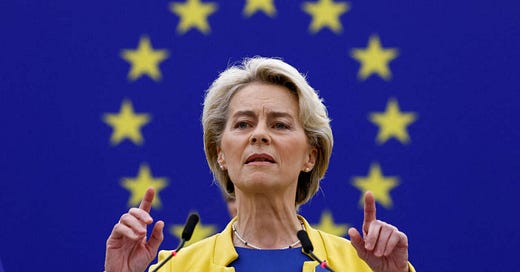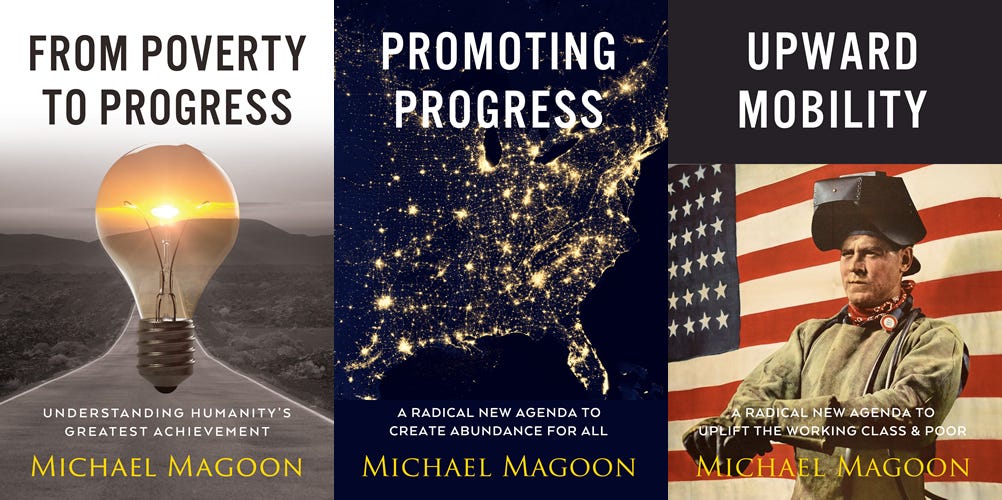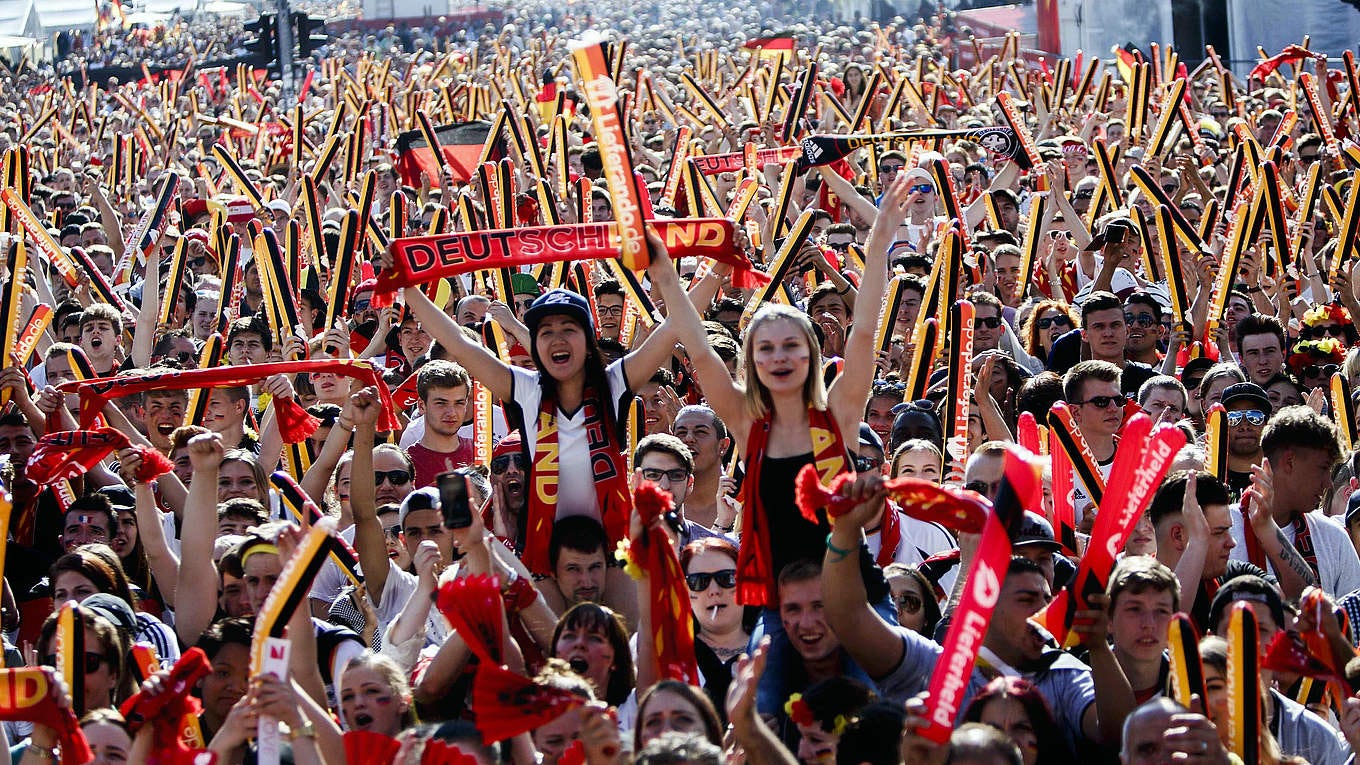The European Union has gone too far
Europe needs to rediscover the benefits of decentralization of power
So far most of my articles on policy reform proposals have been about the United States. Today, I want to focus on Europe.
To put it bluntly, Europe has lost its way. As a committed Europhile who majored in Modern European History at university, lived for one year in London and two years in Copenhagen, this is painful for me to write. I still love Europe, but I am very concerned about the direction that it is going. Quite frankly, I am not sure that there is a way out for Europe without massive, and likely painful, reforms.
As all of my readers know, Europeans have made extraordinary contributions to the building of material progress. As I wrote in other articles, I believe that material progress originated in the Medieval city/states of Northern Italy, spread to Flanders (in modern-day Belgium), then to the Dutch Republic, and finally to southeast England. Then, Britain massively accelerated the growth in the Industrial Revolution, which spread to most of Western Europe. After recovering from two devastating world wars, Europe experienced massive economic growth from 1946 to 1973.
Since 2007, the Western European economy has been stagnant. As measured by per capita GDP, most Western European nations have been essentially flat. And this is a time period that is longer than the Great Depression in the 1930s. Something has clearly gone wrong.
I have already written several articles on the negative effects of Green energy policies. The fact that Europe has fully embraced these dangerous policies is surely a major cause of European economic stagnation. Energy, and particularly electricity, has gotten so expensive that it seriously undermines all sectors of the economy.
Today I want to talk about the dangers of overcentralization. As my regular readers already know, I believe that one of the Five Keys to Progress is decentralized political, economic, religious, and ideological power. It is of particular importance that elites are forced into transparent, non-violent competition that undermines their ability to forcibly extract wealth from the masses. This also allows citizens to freely choose among institutions based upon how much they have to offer to each individual and society in general.
In previous articles, I wrote about the dangers of over-centralization in the US federal government. Today, I want to talk about the dangers of over-centralization in the European Union. Ironically, the continent that pioneered the decentralization of power that kick-started modern material progress is now moving rapidly in the other direction.
The following is an excerpt from my second book Promoting Progress: A Radical New Agenda to Create Abundance for All. You can order e-books at a discounted price at my website, or you can purchase full-price ebooks, paperback, or hardcovers on Amazon.
Other books in my “From Poverty to Progress” book series:
The European Union has moved far beyond its original vision of a free trade zone with democratic governance and peaceful conflict resolution. The Union is increasingly trying to eliminate diversity between European nations in the name of “harmonization.” Europeans seem to have forgotten that it was the fragmentation and diversity of political institutions that originally made Europe the most dynamic economy in the world.
I lived in Europe during the 1980s when this process was getting started. I was a big fan of European integration, but gradually over time, I have come to realize that the process has moved much too far. When European judges and bureaucrats nullify perfectly good legislation or regulations just because it is different from EU standards, this undermines the very foundation of what made Europe great in the first place.
A warning sign
The failed attempt to ratify a treaty establishing a Constitution for Europe in 2005-06 should have been a wake-up call. Referenda in France and the Netherlands led to defeat. Rather than embarrass themselves with further evidence of popular opposition, further referenda were canceled in the Czech Republic, Denmark, Ireland, Poland, Sweden, and the UK. After a “period of reflection,” a slightly modified Treaty of Lisbon was implemented anyway.
The subsequent withdrawal of the United Kingdom from the European Union, the economic stagnation over the last 15 years, and the rise of anti-EU parties on both the Right and the Left show that the failure to ratify was not an isolated incident. The fate of the European Union is uncertain, and the EU has no one to blame but itself.
Bureaucrats and judges in Brussels are relentlessly taking away power from democratically-elected national assemblies. Any objection to this trend is dismissed as mindless “populism.” But one does not have to be a “populist” to be concerned by this centralizing trend.
It should not be a surprise that Europe has been experiencing some of the slowest economic growth in the world for quite some time. As of today, the European economy has essentially been stuck in a stagnant economy since the recession of 2008. Per capita GDP has not budged for 15 years… and counting. At the time of writing, the economic situation only appears to be getting worse.
Enabling national and local governments to experiment with different policies will lead to greater innovation. Those innovations can make a big difference in reinvigorating European economic growth.
The European Union should not give up on its original goal of free trade, peaceful conflict resolution, and democratic governance, but judges and bureaucrats in Brussels need to give nations and regions greater license to go their own way. Diversity within the European Union is not a threat to the future of the Union, it will only strengthen it.
Allow two currencies
Allowing nations to go back to using their national currencies, while still keeping the Euro for international business and tourism would be a big step toward loosening the reins. Each of these national currencies would freely float relative to both the other national currencies and the Euro. This would allow each nation to pursue its own monetary policy without negatively affecting other nations.
To make this workable, businesses throughout Europe might be required to accept both the local currency and the Euro. Customers would be allowed to pay for an item using either currency. Given that the vast majority of transactions are now conducted digitally, this does not seem unworkable.
A diversity of immigration policies
Allowing nations to protect their own borders against immigrants within Europe and those coming from outside Europe could greatly tone down the tense politics regarding immigration and multiculturalism. European nations who want to accept immigrants or migrants should be allowed to do so. European nations who want far fewer immigrants or migrants should also be allowed to act on that wish. They should also be allowed to choose which immigrants or migrants to accept.
Stop forcing Green policies
Each European nation should also be allowed to determine its own agricultural and energy policies. Currently, the European Union is trying to force Green energy and agricultural policies on its member nations. Some nations like that, while others do not. Each should be able to choose for themselves.
Decentralizing the EU, particularly in the domains of finance, immigration, energy, and agriculture might be a way to save the Union. A decentralized EU is far better than an overly-centralized EU or no EU. If Brussels continues along its current path, it will get the least desirable of all outcomes.
Celebrate national identity
The problems within the European Union go beyond policy. Brussels and many other institutions in Europe seem intent on abolishing national identity and replacing them with a common European identity. Changing identity is not in itself a problem, but when it is accomplished by centralized institutions without much public influence, it is very troubling.
These elites have convinced themselves that nationalism is dangerous and out-moded in the modern world. They equate nationalism with war, authoritarianism, emotionalism, and conflict. However, war, authoritarianism, emotionalism, and conflict existed long before nationalism and will continue to exist even if nationalism is eliminated.
There is nothing inherently wrong with national identity. It seems to be a core need of the vast majority of people to identify with a group that transcends their immediate family. Perceiving oneself as a citizen of the world or a continent is fine for some intellectuals, but it is too high a level for most people.
The only real alternatives to national identity are the identities of the clan, tribe, race, ethnicity, religion, or empire. The nation-state has proven itself as the most effective means of preserving cultural diversity while maintaining effective institutions in a specific geographical area.
There is absolutely nothing wrong with Danes, Poles, Italians, Greeks, and, yes, even Germans being proud of their national traditions and accomplishments. Nor is there anything wrong with each of them wanting to preserve those traditions by establishing separate institutions governed solely by elected national, regional, and local legislatures.
If Brussels is not careful, all the wonderful national diversity throughout the continent will be eliminated for the sake of harmonization. Rather than leading to a higher form of identity, this harmonization will probably lead to people without a true common sense of identity. After all, if every European nation follows the same diversity policies, there will be much less diversity between European nations in the long run.
Above all, European judges and bureaucrats must allow national and local experimentation. Perhaps every European standard is better than all the previous local standards, so it should be imposed. But what about 20 years from now? How do you know what works if no variation is allowed? Variation enables evolutionary processes to find a way and to develop.
The European Union should go back to being a voluntary agreement between independent and sovereign nations based on:
Free trade
Democratic governance
Peaceful conflict resolution
Going much beyond that is a mistake that threatens to undermine everything that made Europe great in the first place.
Europe, the homeland of Commercial societies, needs to rediscover the local experimentation that once made it the most dynamic continent in the world. The alternative may be Brexit on a much greater scale.
The European Football Championships give a taste of what we can achieve by European nations competing against each other in non-violent transparent competition. Each nation can be proud of its national accomplishments, while still learning from other nations and working hard to outdo all the other European nations.
Competition enables this to happen. Bureaucracy stifles it.
Most of the above was an excerpt from my second book Promoting Progress: A Radical New Agenda to Create Abundance for All. You can order e-books at a discounted price at my website, or you can purchase full-price ebooks, paperback, or hardcovers on Amazon.
Other books in my “From Poverty to Progress” book series:










It should have stayed focused on freer trade and freedom of movement and joint defense. The Euro was another mistake until greater economic integration was achieved.
Coming over from your 1/5/25 post on the 2025 election prospects:
this was helpful in answering my question there, but of course none of us can truly guess the future.
On the multiple currency item, is another alternative to separate the Euro into a northern and a southern group of countries, as they seem to have different attitudes about fiscal responsibility, paying their taxes, possibly even attitudes toward commecial activities, etc.
I do struggle to understand just how the Greens viewpoint became so dominant. While I was supportive of the 1970 Earth Day, took a couple of solar energy classes in grad school, and continued to watch for advances in solar efficiency and wind generation innovations, eventually real experience and deeper analysis has shown the renewables energy cost - benefit calc is just not there. To have given up on existing and planned nuclear power in favor of these alternatives (and in the higly engineering oriented countries of Germany and UK, too!) is just hard to fathom.
Once again, I suppose indoctrination, ideology, and religion equivalence took over? Add a lust for power and here we are. A good example of a bad example. And a demonstration of just how resiliant but still somewhat fragile our US federal constitutional order really is.